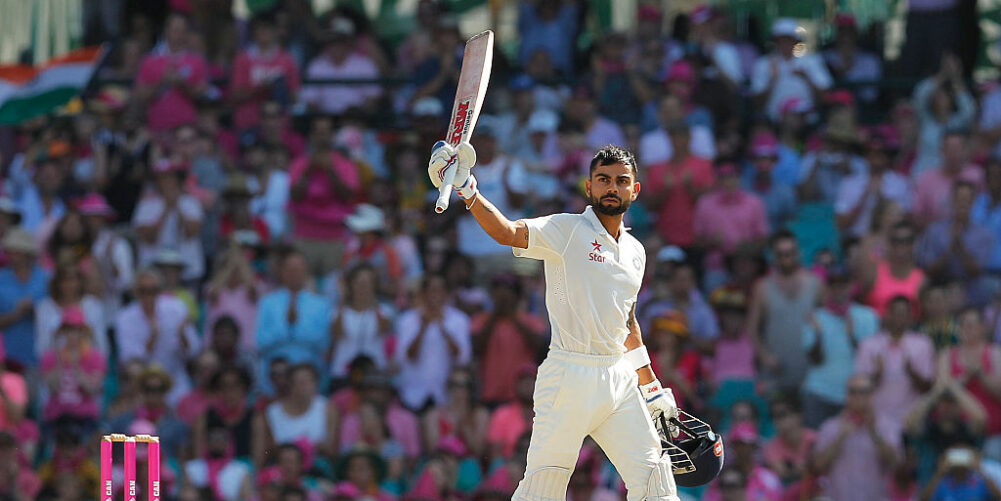By Derek Pringle
Spats between Australia and India are not unknown on cricket fields though this one does smack of much ado about nothing. After all, it is not as if a Test series between these two sides wants for publicity, the cricket played already having been riveting in its many twists and turns.
Yet nearly everyone, from the chief executives of the two boards to former greats like Sunil Gavaskar, below, have weighed in about a misdemeanour that has been standard practice through the ages – that of a batsman trying it on.
The fact that Steve Smith, the man whose desperate palm up query to the Australian dressing-room over whether to refer an lbw, is captain muddies the water slightly, but in a vindaloo-hot Test series like this it would be only human to forget the responsibilities of that office and to grab for any survival mechanism at hand.
This, presumably, is how the match referee Chris Broad, himself occasionally a batsman reluctant to believe he was out, saw it. Broad’s decision not to lay charges meant that the International Cricket Council did not punish Smith or Virat Kohli, India’s captain having sought to inflame matters in the post-match Press-conference despite India winning the Test and levelling the series.
With nostrils flaring, Kohli stopped short of calling Smith and the Aussie team cheats at that Press conference, but questioned how Smith could claim his “turn” to the dressing-room to be a “brain fade,” the phrase Smith used to describe his actions, when the same thing had gone on several times during the match. Fine cricketer that Kohli is, this was the schoolyard brat in him given full voice once more.
Australia’s response to Kohli’s accusations of malpractice, primarily through James Sutherland, Cricket Australia’s chief executive, was indignation but this has been naive and played straight into the hands of India’s captain. Sutherland should have known from the way Glenn McGrath used to operate that some players need to pick a fight in order to perform at full tilt. So far, Kohli has had a lean series with the bat scoring just 40 runs from four innings. It should have been the intentions of Aussies everywhere to keep it that way.
It doesn’t take a genius to know that, like McGrath, Kohli plays better when full of righteous ire and this matter has given him something to latch on to and get wound up about. The only problem now is how to maintain it until he next takes guard, there being a week’s gap before the next Test in Ranchi.
Perhaps this is what Gavaskar was trying to do when he popped his two rupees worth into the pot to keep it boiling. Mind you, he seemed to be having a go as much at Broad and the ICC as Smith, asking whether they would have acted with such equanimity if one of India’s batsmen had been caught seeking guidance from the dressing-room over DRS.

The issue could be kept simmering by Rahul Johri, the chief executive of the Board of Control for Cricket in India, who can appeal the ICC’s decision which cleared Smith of any Code of Conduct breaches. As a means of keeping Kohli wound up, such a decision would be tactically sound, though in doing so Johri would elevate the sideshow above the main event (the cricket), and that would be regrettable.
Getting somewhat lost amid all the accusations and name calling is how DRS, widely accepted as a useful tool on pitches that don’t deviate much, is proving somewhat thorny on spicy pitches where balls change direction both vertically and horizontally, often in unpredictable ways.
With batting difficult enough, the sharp angles taken by the ball have also tested DRS’s predictive path to the hilt. The inventor of DRS admits there is a small error in the predictive path but any latitude, at present, is given to the umpire’s original decision. Hence you get a crazy instance like David Warner’s lbw to Ravichandran Ashwin in the second innings at Bangalore, which looked iffy on several counts but stayed out because the umpire’s call was satisfied, sort of.
It used to be that any benefit of doubt went to the batsman and that can be reinstated under DRS by giving the leeway now afforded umpires back to the willow wielders. Trouble is, the ICC want to protect their umpires, though in doing so they are making DRS look fall-ible, especially on pitches that spin sharply.
Yet, difficult though it may be to judge many lbws in such circumstances, there was no doubt about Smith’s which was plumb, Australia’s captain undone by an unplayable grubber from Umesh Yadav.
As his team’s best hope of winning, Smith had to explore whether the ball had any chance of missing, his bat having got nowhere near making contact. His first port of call was to Peter Handscomb, the non-striker. Yet Handscomb, who unless in possession of a severe strabismus, bottled it.
Presumably, as a sop to him not relaying the horrible truth to his skipper, he then suggested Smith look to the dressing-room, which he did, the tension of the moment unable to prevent the Australian captain’s body from reflexing into inquiry.
This was, according to Kohli, “a line that should not be crossed on a cricket field”, but then India have never been comfortable using DRS. So far, the match referee and the ICC have disagreed with him, though I suspect the ramifications have a way to run yet in this fascinating, ding-dong series.
*This article originally featured in The Cricket Paper’s 10 March 2017 edition.















